The document discusses the three certainties required to create a valid private express trust: (1) intention, (2) subject matter, and (3) object. It provides details on each certainty, including examples from case law. For certainty of intention, the words used must show the settlor's clear intention to create a trust. For certainty of subject matter, the trust property must be clearly defined or ascertainable. For certainty of object, the beneficiaries must be human and ascertainable as individuals or as members of a defined class.
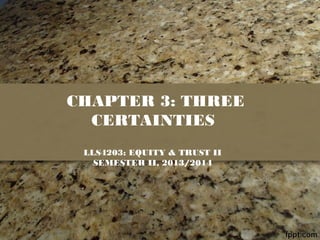




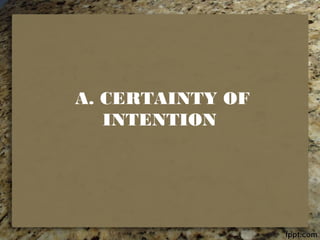
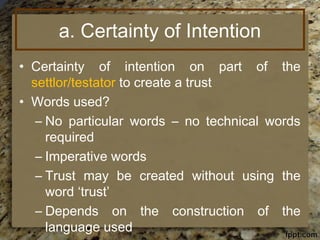

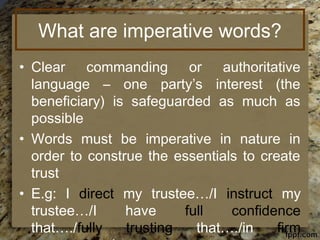
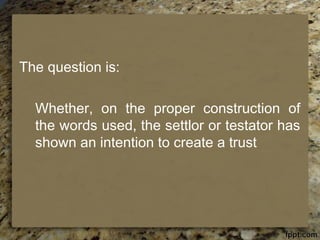

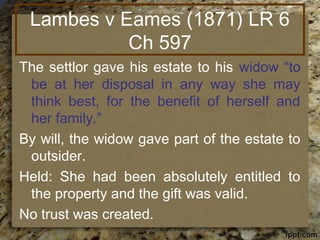



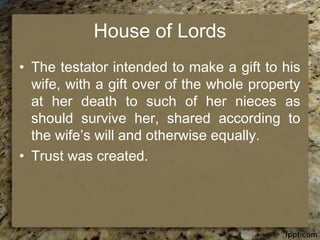



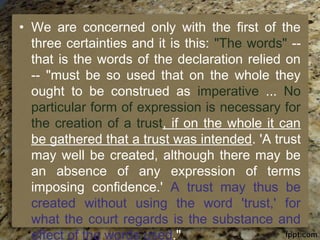

![Midland Bank plc v Wyatt [1995]
1 FLR 696
• A declaration of trust was executed by a
husband and wife in 1987 (when the
husband was contemplating a new
business) whereby the family home, their
only asset, was apparently settled on the
wife and daughters. He kept the trust
document in a safe. The couple continued
to act as real owners by mortgaging it. The
husband’s business failed and the bank
obtained a charging order against the](https://image.slidesharecdn.com/chapter2-threecertainties-140518070208-phpapp02/85/3-Certainties-of-Trust-22-320.jpg)

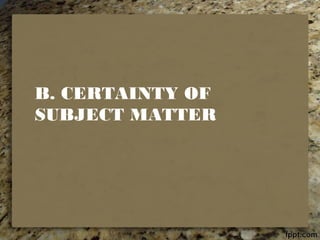





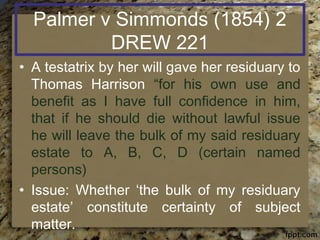

![Hunter v Moss [1994] 3 All ER
215
• The defendant was the absolute beneficial
owner of 950 shares in a company which
had issued share capital of 1,000 ordinary
shares. The plaintiff claimed that as a
condition of his employment by the
company the defendant had agreed to
give him a 5% shareholding (ie 50 shares)
in the company. The defendant refused to
transfer the shares and the plaintiff issued
a writ claiming to be beneficially entitled to](https://image.slidesharecdn.com/chapter2-threecertainties-140518070208-phpapp02/85/3-Certainties-of-Trust-32-320.jpg)


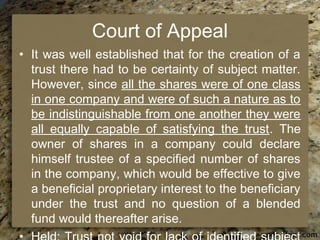

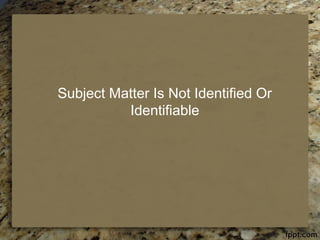
![MacJordan Construction Ltd v Brookmount
Erostin Ltd [1992] BCLC 350
• A building contract provided that the
employer would retain 3% of the contract
price as trustee for the builder (pending
confirmation of the work was satisfactory).
The retention fund was never set up. The
employer went for insolvency. The builder
claimed entitlement to the retention
money.
• Held: no trust created as there was no
identifiable assets that had been](https://image.slidesharecdn.com/chapter2-threecertainties-140518070208-phpapp02/85/3-Certainties-of-Trust-38-320.jpg)




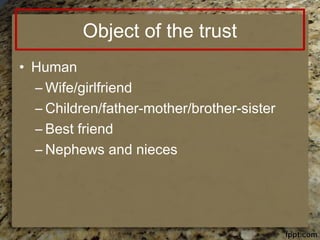

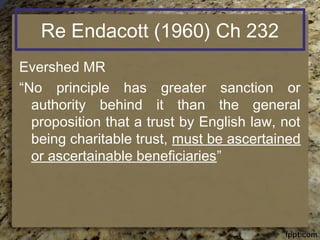







![McPhail v Doulton [1971] A.C.
424
• A deed recited that a settlor would transfer
to trustees shares in a company to form
the nucleus of a fund for the benefit of the
staff of the company, their relatives and
dependents. Clause 9 provided:
• "(a) The trustees shall apply the net
income of the fund in making at their
absolute discretion grants … in such
amounts at such times and on such
conditions (if any) as they think fit …”](https://image.slidesharecdn.com/chapter2-threecertainties-140518070208-phpapp02/85/3-Certainties-of-Trust-53-320.jpg)
![• (b) The trustees shall not be bound to
exhaust the income of any year or other
period in making such grants … and any
income not so applied shall be … [placed
in a bank or invested].
• Clause 10 provided that all benefits being
at the discretion of the trustees, no person
had any interest in the fund otherwise than
pursuant to the exercise of such
discretion.
• the appellants, the settlor's executors,
alleged that the deed was wholly void and](https://image.slidesharecdn.com/chapter2-threecertainties-140518070208-phpapp02/85/3-Certainties-of-Trust-54-320.jpg)

![RE GULBENKIAN'S
SETTLEMENT [1970] A.C. 508
The settlor made a trust instrument stated
that:
"all or any one or more to the exclusion of
the other or others of the following
persons, namely, [G.] and any wife and his
children or remoter issue for the time
being in existence whether minors or
adults and any person or persons in
whose house or apartments or in whose
company or under whose care or control](https://image.slidesharecdn.com/chapter2-threecertainties-140518070208-phpapp02/85/3-Certainties-of-Trust-56-320.jpg)


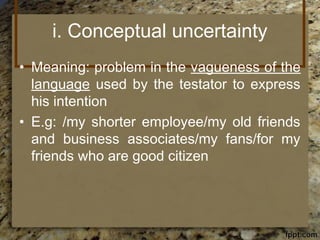


![Re Barlow's Will Trusts [1979] 1
All ER 296
The testatrix directed the sale of some
paintings subject to the provision that 'any
members of my family and any friends of
mine who may wish to do so' be allowed
to purchase any painting at a price well
below its value.
Held that the direction was valid as it was
possible in the circumstances to say that
at least one or more than one of the
claimants qualified.](https://image.slidesharecdn.com/chapter2-threecertainties-140518070208-phpapp02/85/3-Certainties-of-Trust-62-320.jpg)

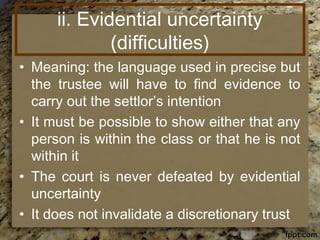

![Re Baden's Deed Trusts (No 2)
[1973] Ch 9, [1972] 2 All ER
1304, CA (Eng)
• The tests
• Stamp LJ (strict literal view-preferred) :
require the trustee to be in a position to
say affirmatively whether any given person
is within or outside the class](https://image.slidesharecdn.com/chapter2-threecertainties-140518070208-phpapp02/85/3-Certainties-of-Trust-66-320.jpg)




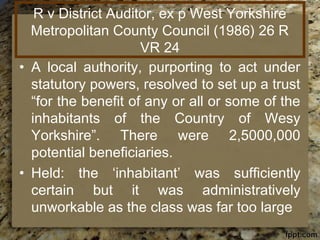
![Re Chin Sem Lin's Settlement, Yong Tet
Foong v Chin Thin Lee [1971] 2 MLJ 152
at 155
• Chang Min Tat J
Where the settlor directed payment to an
ancestral graveyard in China the trust
failed by reason of the existing political
situation and the fact that no members of
the settlor's family were resident in that
country](https://image.slidesharecdn.com/chapter2-threecertainties-140518070208-phpapp02/85/3-Certainties-of-Trust-72-320.jpg)